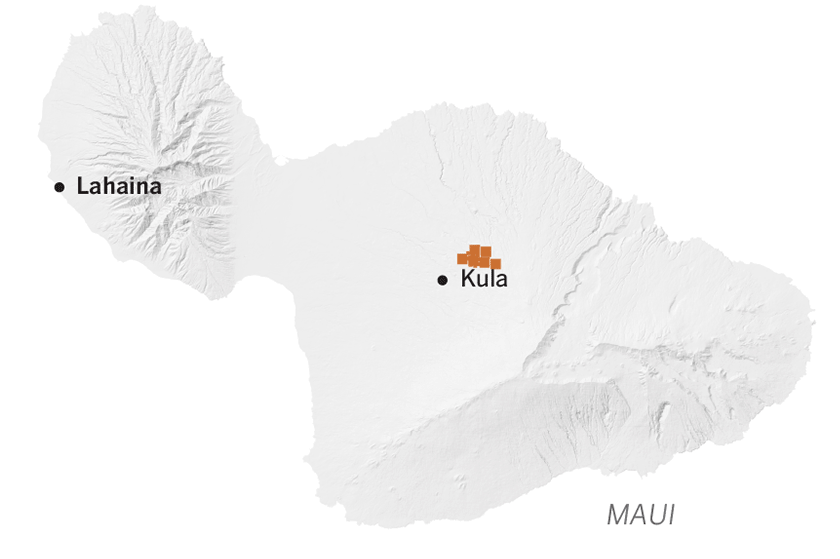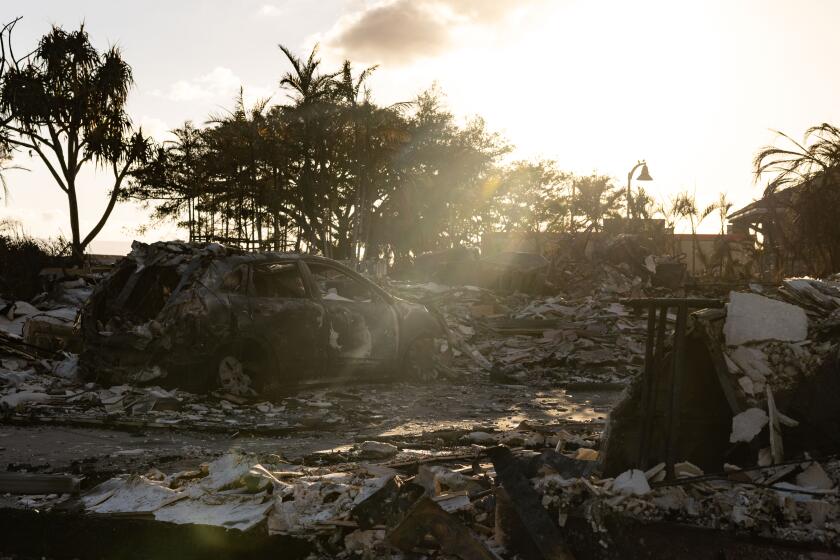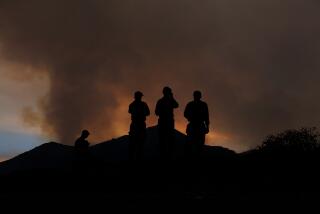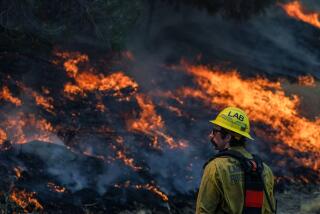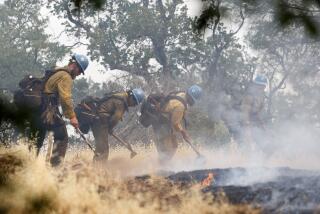Lightning sparks wildfires in Klamath, Shasta-Trinity forests, forcing evacuations
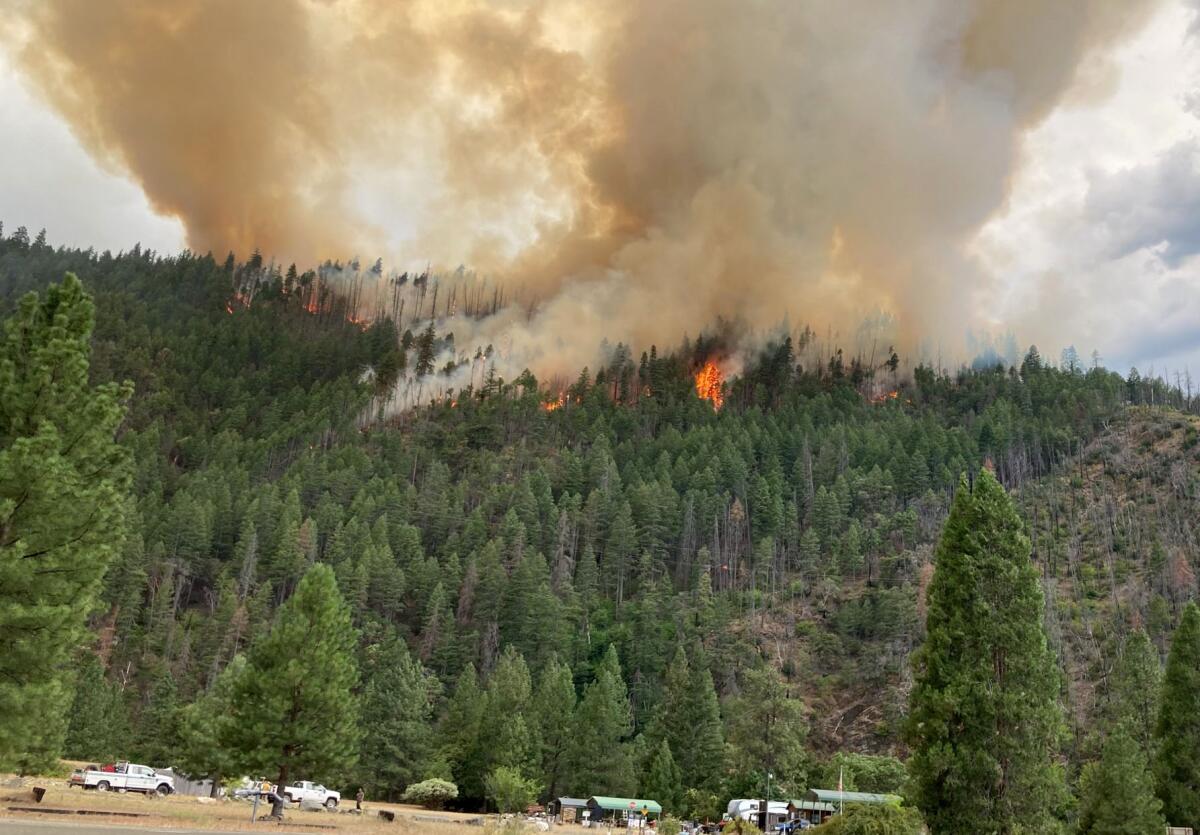
- Share via
Firefighters are battling multiple wildfires in Northern California that were sparked by lightning strikes across forestlands, forcing some residents to flee their homes.
The Head fire burning near the California-Oregon border in Klamath National Forest grew to more than 2,700 acres since it was first reported Tuesday afternoon. As of Wednesday morning, there was no containment on the fire, officials said.
Forecasts show more lightning could strike in the area on Wednesday and a Red Flag warning was issued due to the potential of dry fuels and high winds sparking additional fires.
“We issued the warning, because if there are too many fires that start, it could be too much for firefighters to respond to,” said Brian Nieuwenhuis, meteorologist with the National Weather Service in Medford, Ore.
Highway 96, one of the major arteries through the Klamath National Forest, remains closed due to the fire activity, and there’s no indication when the fire will be contained. Temperatures in parts of Siskiyou County are hovering around 100 degrees, but in other areas the smoke from the fires has brought the temperatures down.
“In a way it’s a good thing, but for a bad reason,” Nieuwenhuis said.
The Upper fire in Shasta-Trinity National Forest has burned 500 acres, according to officials. Firefighters contained several wildfires after a series of lightning strikes passed through the area Monday evening, but the fires burning west of Siligo Peak spread due to erratic winds, officials said. There was no containment on those fire as of Wednesday morning.
The Head fire started burning on the north side of the Klamath River and prompted evacuation orders and warnings for residents in rural Siskiyou County around 6:30 p.m., the U.S. Forest Service said in a statement on Facebook. Officials said the fire continued to grow at a rapid pace overnight.
By 7:40 p.m. the blaze had reached over 1,000 acres in size.
Monday evening lightning strikes sparked 19 wildfires across the forest, stretching firefighters over a wide area as they searched for smoke on the horizon, according to officials.
“We are continuing to experience lightning and substantial winds across the forest,” Rachel Smith, forest supervisor with the Klamath National Forest, said in a statement. By Tuesday evening, the weather fanned extreme fire behavior and a large pyrocumulus cloud formed over the area, Smith said.
The Lahaina fire in West Maui ignited as firefighters focused on the Upcountry fire. What happened next — the deadliest U.S. wildfire in more than a century — left the historic town in ashes.
The largest fire is the Head fire, which is burning near where the Klamath and Scott rivers meet.
“The #HeadFire has increased in intensity and rate of spread and has spotted across the Klamath River due to thunderstorm downdrafts in the area,” officials wrote Tuesday evening. “The evacuation warning has been elevated to an order. PLEASE LEAVE THE AREA IMMEDIATELY.”
The evacuation order from the Siskiyou County Sheriff’s Office covered areas south of Hamburg, east of Horse Creek Road and north and south of Highway 96.
By 9 p.m., an evacuation order was added to the areas of Kelsey Creek, Tompkins Creek and Upper Grider Creek, all south of Forest Route 46n64.
Based on a Times review of Maui records, government officials should have been aware of the fire danger Lahaina faced.
A shelter has been established at the Kahtishraam Wellness Center at 1403 Kahtishraam in Yreka.
Additional fires burning in Klamath National Forest include the Elliot fire near Pony Peak and the Dillon Creek Campground, which was last reported to be around 50 acres, officials said.
Further east, the California Department of Forestry and Fire Protection is battling several wildfires northwest of McArthur in what is being called the SKU August Lightning Complex. The fires, which started burning Tuesday at around 7:45 p.m., have scorched more than 630 acres. Multiple fires in the complex have been contained, but the Ash, Long, Ranch and White fires continue to burn and the fires are only 5% contained, according to Cal Fire.
More to Read
Sign up for Essential California
The most important California stories and recommendations in your inbox every morning.
You may occasionally receive promotional content from the Los Angeles Times.
